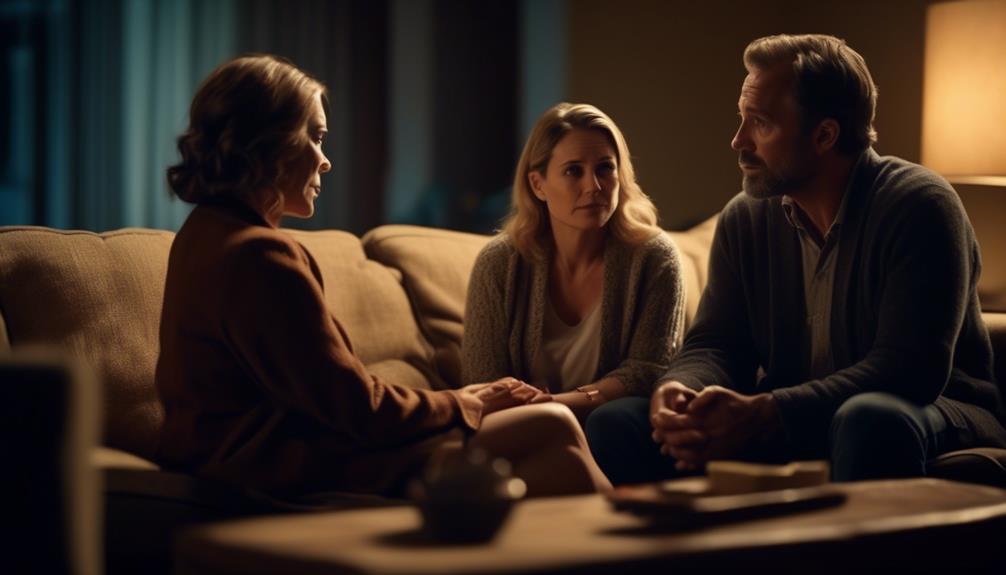How Long Can Counseling Help Troubled Marriages?

So, you've found yourself in a bit of a pickle, haven't you? Your once blissful marriage now teeters on the edge of uncertainty, and you're grasping for a lifeline.
Enter the secret weapon – a powerful solution that holds the key to mending the cracks in your relationship. But how long can this extraordinary remedy truly help troubled marriages?
Well, my friend, prepare to embark on an exploration of the intricacies and possibilities of this transformative journey. From unraveling the role of this remarkable intervention to gracefully navigating potential roadblocks, we'll dive into the depths of what it takes to rebuild a fractured bond.
But be forewarned, there are no overnight miracles or quick fixes here; instead, we'll uncover the hidden nuances that may just hold the key to your happily ever after.
Get ready to discover the extraordinary possibilities that lie ahead.
Key Takeaways
- Counseling provides couples with the tools and strategies to navigate challenges in troubled marriages.
- The duration of counseling for troubled marriages is influenced by factors such as the severity of issues and the willingness of both partners to engage in therapy.
- Individual commitment and active participation in counseling sessions are essential for positive outcomes.
- Setting realistic expectations and understanding that counseling is a process that takes time can lead to meaningful improvements in the marriage.
Understanding the Role of Counseling in Troubled Marriages
If you're going through a difficult time in your marriage, understanding the role of counseling can provide valuable insights and support. In troubled marriages, communication often becomes strained and can lead to misunderstandings and resentment. This is where counseling plays a crucial role in helping couples navigate through their challenges.
Communication is the foundation of any healthy relationship, and in counseling, you'll learn effective communication strategies that can rebuild the connection between you and your partner.
Rebuilding trust is another significant aspect of counseling in troubled marriages. Trust is fragile and can easily be broken, but with the help of a trained counselor, you can begin the process of rebuilding it. Through open and honest conversations, you and your partner can address the underlying issues that led to the breakdown of trust. The counselor will guide you in creating a safe space where both of you can express your feelings and concerns without judgment.
Counseling provides a neutral and supportive environment for couples to work through their problems. It allows you to gain a deeper understanding of each other's perspectives and emotions. With the guidance of a skilled counselor, you can gain the tools and techniques needed to effectively communicate and rebuild trust in your troubled marriage.
Factors Influencing the Duration of Counseling for Troubled Marriages
When it comes to counseling for troubled marriages, the duration of therapy can vary based on a few key factors.
One important factor is the length of therapy sessions. Longer sessions may allow for more in-depth discussions and progress, while shorter sessions may require more time to address issues.
Additionally, the individual commitment of both partners plays a significant role. The more committed each person is to the process and their own personal growth, the more likely counseling will be effective and the duration of therapy will be shorter.
Length of Therapy
The duration of counseling for troubled marriages can be influenced by various factors, such as the level of commitment and willingness to change within the couple. Factors that can affect the length of therapy include:
- Severity of Issues: The more deeply ingrained and complex the problems, the longer it may take to address them effectively. Therapy may require more time to uncover underlying issues and develop strategies for resolution.
- Openness to Change: Willingness to engage in therapy and make necessary changes is crucial. Couples who are committed to the process, open to feedback, and actively participate in therapy are more likely to experience positive outcomes in a shorter period.
Understanding these factors allows therapists to tailor the treatment plan to address the specific needs of each couple.
Individual Commitment
Couples who wholeheartedly commit to the counseling process are more likely to see positive results in a shorter period of time. Individual commitment plays a crucial role in the success of counseling for troubled marriages. When both partners prioritize their personal growth and are willing to put in the effort required, they create an environment conducive to change and improvement. By actively engaging in the counseling sessions, couples can develop stronger communication skills and gain a deeper understanding of each other's needs and concerns. This commitment allows them to work through their issues more effectively, leading to quicker resolution and a more fulfilling relationship. The table below illustrates the impact of individual commitment on the duration of counseling for troubled marriages.
| Level of Individual Commitment | Duration of Counseling |
|---|---|
| Low | Longer |
| Moderate | Medium |
| High | Shorter |
Setting Realistic Expectations for Counseling Outcomes

When it comes to counseling for troubled marriages, it's important to set realistic expectations for the outcomes. Understand that counseling is a process, and it takes time for meaningful change to occur.
While there's no set time frame for how long counseling will take, it's crucial to remember that the goal isn't to fix everything overnight, but rather to work towards realistic improvements in your marriage.
Counseling Time Frame
Setting realistic expectations for counseling outcomes includes understanding the time frame in which progress can be achieved. When it comes to troubled marriages, counseling success and effectiveness can vary from couple to couple. Here are a few factors to consider when thinking about the time frame for counseling:
- Complexity of the issues: The more complex the problems in the marriage, the longer it might take to see significant progress.
- Willingness to change: Both partners need to be committed to the counseling process and willing to make changes for it to be effective.
- Frequency of counseling sessions: Consistent and regular sessions can help speed up the progress.
- Outside support: Seeking additional support from friends, family, or support groups can enhance the effectiveness of counseling.
- Individual circumstances: Every marriage is unique, and factors like personal history, trauma, and external stressors can influence the time frame for counseling outcomes.
Realistic Marriage Improvement
To have a realistic understanding of how counseling can improve your troubled marriage, it's important to set expectations for the outcomes you can achieve. Counseling can be a powerful tool for improving communication and rebuilding trust in a marriage.
However, it's essential to recognize that every marriage is unique, and the progress made will vary from couple to couple. The goal of counseling isn't to magically fix all the problems overnight, but rather to provide you with the tools and guidance to work through the challenges together.
It's important to approach counseling with an open mind and a willingness to put in the necessary effort and commitment. Remember, the success of counseling ultimately depends on both partners actively participating and working towards positive change.
With patience, understanding, and a realistic outlook, counseling can help you and your spouse build a stronger and healthier marriage.
The Importance of Commitment and Consistency in Counseling
Commitment and consistency are crucial elements in counseling troubled marriages, as they provide the foundation for long-term growth and healing. When both partners commit to the counseling process, they demonstrate their willingness to work on the relationship and invest in its future. Consistency in attending counseling sessions and actively participating in the therapeutic process is equally important.
Here are some reasons why commitment and consistency are vital in counseling troubled marriages:
- Building Trust: Consistently showing up for counseling sessions and committing to the process helps build trust between partners and the counselor. Trust is essential for open communication and vulnerability, which are key to resolving conflicts and strengthening the relationship.
- Maintaining Focus: Consistency in attending counseling sessions helps couples stay focused on their goals and the work they need to do. Regular sessions provide a space for reflection, learning, and practicing new skills. It allows couples to stay on track and address any issues that may arise along the way.
Signs of Progress in Counseling for Troubled Marriages

One key indicator of progress in counseling for troubled marriages is when both partners begin to communicate more openly and honestly with each other. This is a crucial step in promoting communication and rebuilding trust within the relationship.
In counseling, you and your partner may learn new techniques and strategies to help facilitate effective communication. This can include active listening, using 'I' statements, and expressing feelings and needs in a non-confrontational manner.
As you and your partner begin to communicate more openly, you may notice a shift in the dynamics of your relationship. Instead of avoiding difficult conversations or resorting to passive-aggressive behavior, you'll start to address issues head-on. This newfound openness can create an environment of understanding and empathy, allowing for deeper connections and a stronger bond.
Rebuilding trust is another important sign of progress in counseling. Trust is the foundation of any healthy relationship, and when it has been damaged, it takes time and effort to repair.
During counseling sessions, you and your partner may work on rebuilding trust by addressing past hurts, acknowledging the impact of actions, and developing new patterns of behavior. As trust begins to be restored, you may feel more secure and confident in your relationship.
Navigating challenges and potential roadblocks in counseling can be a complex and delicate process, requiring patience, understanding, and a willingness to confront difficult emotions and issues head-on. When it comes to troubled marriages, there are specific challenges that may arise during counseling. Here are some key factors to consider:
- Navigating resistance: It isn't uncommon for one or both partners to initially resist counseling. This resistance may stem from fear, skepticism, or a reluctance to face painful truths. As a counselor, it's essential to approach this resistance with empathy and understanding. Help the couple explore their concerns and fears, creating a safe space for them to express their reservations.
- Managing communication: Communication breakdown is often a significant issue in troubled marriages. In counseling, it's crucial to help the couple improve their communication skills. Encourage active listening, effective expression of feelings, and the use of 'I' statements. Provide them with tools and techniques to enhance their communication, such as setting boundaries, practicing empathy, and validating each other's emotions.
Long-Term Benefits of Counseling for Troubled Marriages

By participating in counseling for your troubled marriage, you can gain valuable long-term benefits that can help strengthen and improve your relationship. Counseling provides a safe and supportive environment where you and your partner can openly communicate and address the underlying issues that have been causing distress in your marriage. Through counseling, you can develop effective communication skills, learn how to resolve conflicts in a healthy manner, and rebuild trust and intimacy.
One of the key benefits of counseling is the opportunity to gain a deeper understanding of yourself and your partner. A skilled counselor can help you identify patterns of behavior and thought that may be contributing to the problems in your marriage. This self-awareness allows you to make positive changes and break destructive cycles.
Counseling also offers long-term support and guidance. Even after completing a counseling program, you can continue to apply the skills and strategies learned to maintain a healthy and fulfilling relationship. The tools acquired in counseling can serve as a foundation for ongoing growth and development in your marriage.
Moreover, counseling can help you and your partner develop a strong sense of teamwork. As you navigate through the challenges together, you'll learn how to collaborate, compromise, and support each other. This sense of unity and shared goals can create a solid foundation for a lasting and fulfilling relationship.
Frequently Asked Questions
How Much Does Marriage Counseling Typically Cost?
Marriage counseling can be a valuable investment in your relationship. The average cost varies depending on factors like location and therapist experience. However, the effectiveness of counseling is more important than the price tag.
Can Counseling Guarantee That My Troubled Marriage Will Be Saved?
Counseling can't guarantee saving your troubled marriage, but it can be effective. Success rates vary depending on the couple's commitment and effort. Remember, "where there's a will, there's a way."
Will Counseling Sessions Involve Both Partners Together or Separately?
Counseling dynamics vary, and sessions can involve both partners together or separately. Individual counseling offers benefits like self-reflection and personal growth. Remember, counseling is about supporting you both and finding what works best for your troubled marriage.
How Long Does It Usually Take to See Improvements in a Troubled Marriage Through Counseling?
On average, it takes time to see improvements in troubled marriages through counseling. The duration varies, but measuring the effectiveness is crucial. Remember, healing takes patience and commitment, and the journey is worth it.
Are There Any Alternative Options to Counseling for Troubled Marriages?
Marriage retreats and online marriage courses are alternative options to counseling for troubled marriages. They can provide valuable tools and resources to help you work through your challenges and improve your relationship.











